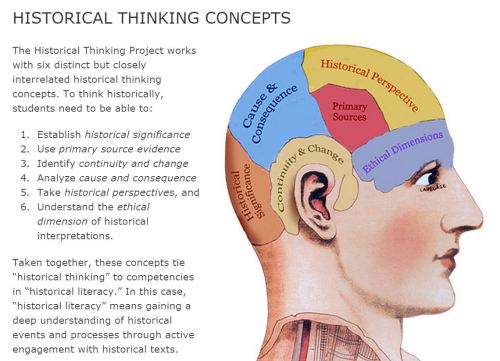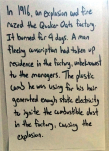New Directions in Active History, London, 2-4 October 2015
5 February 2016 - 8:58am
This blog originally appeared on activehistory.ca on October 4th, 2015
The majority of attendees of this conference are researchers and academics from history departments across Canada, but there were also a handful of archivists and I would encourage other archivists to attend in the future if you get a chance. It’s fascinating to catch up with trends in historical research and in work on the engagement of the public with history.
This post is a quick summary of some of the things that jumped out at me as interesting in the past two days of discussions. I always think that conferences with parallel sessions are a bit like a ‘Choose your own Adventure’ game: we are all at the same conference, but we pick our own path through it and all end up with a slightly different experience at the end.
In the plenary at the beginning of the conference Keith Carlson talked about the Historical Thinking concepts which I have not come across before (I feel somewhat ashamed about this!). There’s a whole website dedicated to it, and an archivist it’s great to see primary sources featured so prominently.

Keith noted that although God cannot change history, historians can, depending on their interpretations of past events. Stories, Keith said, are the essence of good history. In the same panel was Wendy Rowney of the Black Creek Pioneer Village, who had undertaken a study of what makes successful museums so successful. Interactions with guides were important, but having connections to real historical figures that visitors can relate to was also key: Wendy described a museum in a house where adult visitors were elbowing each other out of the way to read a census record listing the original inhabitants of the building.
The first session I attended on the Saturday was the Memories of the First World War Roundtable, which started with a discussion by two University of Western Ontario historians about presenting alternative narratives to the accepted national myths about the war, and the pushback they have received over their article on the white poppy. Monuments like the proposed Mother Canada statue and Monument to the Victims of Communism were discussed in this context. This was followed by a description of the Great War Centenary Association’s collaboration and their ‘Doing Our Bit‘ website. High school teacher Meghan Cameron gave an interesting talk about teaching Grade 10 students about the war by connecting them to local landmarks and local soldiers. She only has two and a half weeks to teach the topic and generally the children have no prior knowledge about the war. The topic of national myths came up again: Peter Farrugia of Wilfrid Laurier University talked about Stephen Harper’s speech on the anniversary of the beginning of the war, which included the following lines:
"No longer can they tell their stories of courage and honour and duty. But every time we take a stand to defend the values for which they fought and for which so many died, we remember their stories in the only way that really matters."
To Canada’s prime minister, the only way that we can really remember these men is by going to war again. As Peter asked: where does that leave the work of historians?
One of the audience members noted that high school teachers are very concerned about presenting points of view to their students that might conflict with the accepted national narrative. Meghan mentioned that the school board for her area had prohibited any discussion of politics in advance of the Federal election on October 19th.
The second session of the day was on the topic of community engagement: Sarah Story and I represented the archivist contingent, alongside Anne Janhunen, an environmental historian who talked about her work with First Nations communities and Peter Anderson, who discussed his work on raising awareness of the history of the Central Experimental Farm in Ottawa and his experience of writing opinion pieces (he referenced the Op-Ed Project as a useful resource). There were some great questions after our presentations. I hope I opened people’s eyes to the way that archivists can help get history out into our communities: it doesn’t all need to fall on the shoulders of the historians!
 In the afternoon, I went to an interesting session on storytelling using non-traditional means, such as film, graphic novels and performances. Matthew Hayes from Trent University described projects using ephemeral items placed around the town of Peterborough, including some posters with historical-sounding facts (which may or may not have been true). This was designed as an antidote to the more traditional, authoritative street-furniture approach to history found in small towns. A similar theme to this was picked up later in the day by Andrea Legg of Lakehead University, who was looking at the type of history portrayed in historic house museums: the authority and authenticity of objects in those houses and how they can be subverted by art installations.
In the afternoon, I went to an interesting session on storytelling using non-traditional means, such as film, graphic novels and performances. Matthew Hayes from Trent University described projects using ephemeral items placed around the town of Peterborough, including some posters with historical-sounding facts (which may or may not have been true). This was designed as an antidote to the more traditional, authoritative street-furniture approach to history found in small towns. A similar theme to this was picked up later in the day by Andrea Legg of Lakehead University, who was looking at the type of history portrayed in historic house museums: the authority and authenticity of objects in those houses and how they can be subverted by art installations.
Jennifer Chutter of Simon Fraser University looked at the issue of heritage designation and the way that certain types of property (usually those owned by the wealthy and white) are privileged in the designation process, while older houses which have been divided up into affordable apartments are more likely to be taken down in the name of progress. She focused on Vancouver in her presentation, where ‘old-stock’ homes from the 1930s are being demolished and replaced by ‘monster houses’ built by newer immigrants trying to maximise their investment in the land. (The ‘old-stock’ issue came up repeatedly over the course of the conference!)
Today was more about reflecting on what the Active History website is and should be. We had some fascinating small group discussions on this topic. One thing that really surprised me was learning (anecdotally) that having a good profile in traditional and social media circles isn’t necessarily helpful in advancing in an academic career in Canada. It doesn’t count as ‘scholarship’, it seems (!). This contrasts quite dramatically with the situation in the UK, where these days it’s all about Impact, and the more you can prove you’ve been quoted in the media or in online interactions, the better. I think this will change as the old guard of academic departments gets replaced by more media-savvy newcomers, but it seems a shame that people are actually being penalized for getting their research out to a general
The whole event has been stimulating and has certainly made me think about public engagement, government policy and issues around historical authority in a new way.
- Se connecter ou créer un compte pour soumettre des commentaires

